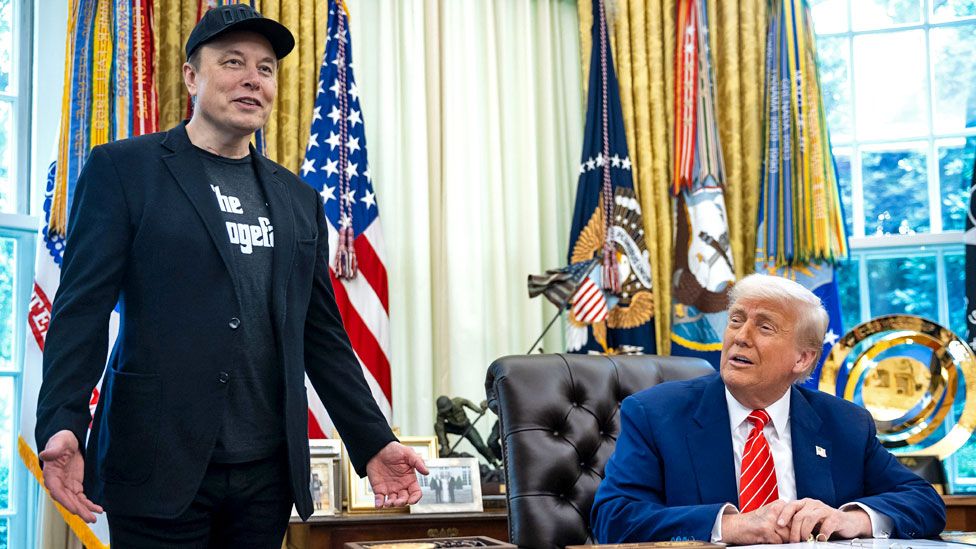602
By Lizzy Chirkpi
A dramatic public rift has erupted between two of the world’s most prominent figures, President Donald Trump and tech mogul Elon Musk, after the SpaceX and Tesla CEO loudly criticized Trump’s signature legislative proposal.
The piece of legislation titled, “One Big Beautiful Bill” at the heart of the rift between Elon Musk and President Donald Trump is a controversial legislative proposal focused primarily on tax cuts and spending reforms. While Trump has lauded it as a monumental achievement, Musk has vehemently criticized it as a disgusting abomination that will significantly worsen the national debt.
Musk claimed that he was never shown the bill and that it “was passed in the dead of night so fast that almost no one in Congress could even read it!” This fuels his narrative of the bill being poorly conceived and rushed through.
The drama unfolded Thursday as President Trump openly expressed his disappointment in the CEO of Tesla and SpaceX, hinting at a potentially irreparable fracture in their previously chummy relationship.
The friction became undeniable when Trump, speaking to reporters, directly addressed Musk’s public opposition to the bill, which the President has affectionately dubbed “One Big Beautiful Bill.” Just a day prior, Musk had taken to social media, urging lawmakers to kill the bill, a sentiment that clearly irked the President.
The President’s remarks signal a significant downturn in a relationship that has seen Musk advising Trump on various matters and even serving on presidential advisory councils during the Trump administration.
In a characteristic move, Trump did not shy away from speculating on Musk’s motives.
In his backlash, he suggested that the billionaire might be suffering from “Trump Derangement Syndrome,” a term often used by Trump to describe intense criticism from his opponents. He also hinted, “Elon and I had a great relationship. I don’t know if we will anymore.”
Furthermore, the President implied that Musk’s outspokenness might stem from a longing for the influence he once held within the White House orbit. “He misses the White House,” Trump quipped, suggesting a personal slight rather than a policy disagreement was at the heart of Musk’s opposition.
The exact provisions of the “One Big Beautiful Bill” that have drawn Musk’s ire remain a subject of intense speculation and debate. However, Musk’s firm stance and Trump’s swift, sharp rebuke indicate a high-stakes legislative battle where even influential allies are not immune to the President’s public outburst.
Analysts have said the public spat highlights the volatile nature of political alliances in Washington and the significant influence figures like Musk wield in shaping public opinion and legislative outcomes.
Background of the “One Big Beautiful Bill”:
A core component of the bill is the extension of the major provisions from the 2017 Tax Cuts and Jobs Act (TCJA). These tax cuts, originally enacted under the Trump administration, are set to expire at the end of 2025.
Proponents argue that extending them will continue to stimulate economic growth and benefit working families, while critics contend they primarily benefit the wealthy and contribute to the national debt.
Secondly, the bill includes some new tax cuts, such as eliminating taxes on tips and overtime pay, and providing tax relief for seniors. The legislation proposes significant spending reductions, particularly in areas like Medicaid and the Supplemental Nutrition Assistance Program (SNAP), through stricter eligibility requirements and work mandates.
Despite overall spending cuts, the bill also allocates additional funding for defense and border security.
Consequently, the contentious point is the bill’s scaling back or termination of certain clean energy tax credits and electric vehicle subsidies that were established under the Inflation Reduction Act. This directly impacts companies like Tesla, which benefit from such incentives.
The bill reportedly includes an increase in the state and local tax (SALT) deduction cap, a provision often sought by House Republicans from high-tax states.
Another major point of contention and the primary reason for Musk’s outrage is the Congressional Budget Office’s (CBO) assessment that the bill would add a substantial amount estimated at $2.4 trillion or more to the federal deficit over the next decade.
The White House disputes these figures, arguing that dynamic scoring (accounting for economic growth) would show a different picture.



